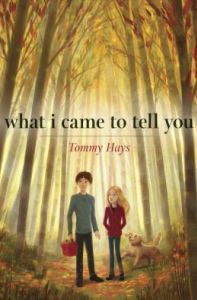Banned Books Month: Guest Post from Tommy Hays: On Trial in the Library
I stood in front of the desk, as Mrs. Finley, my fifth grade teacher, who sat where the librarian usually sat, slid the check-out card in my direction.
“Did you write that, Tommy?”

Egmont USA, September 2013.
Before I even read it, I knew something was wrong. Just a few minutes earlier Miss Watts, the school librarian, had come to our classroom door, and she and Mrs. Finley had whispered animatedly about something. Then Mrs. Finley, a usually warm, kind teacher, came up to my desk and in an icy tone asked that I come with her. I followed her down the hallway and around the corner to the school library, which was eerily empty, Miss Watts nowhere in sight.
The library had always been my refuge at Donaldson Elementary, the one place at school I felt at home, spending endless hours combing the biography section or sitting at a table reading about Robert E. Lee, Ulysses S. Grant, Betsy Ross, Jim Bowie, Daniel Boone, Eli Whitney, George Washington Carver, Clara Barton, Thomas Edison or Alexander Graham Bell. I loved losing myself in the company of these great men and women. And always after finishing one of these books, I felt a quiet sense of elation, that perhaps a little bit of their greatness might’ve rubbed off on me somehow. I was a shy, quiet, chubby, slightly depressive boy and these books always lifted my spirits and gave me something akin to hope.
So it was a shock to me to be in the empty library, a place I’d always felt welcomed, even supported, in front of a clearly agitated teacher. At the top of the card was typed John F. Kennedy and PT-109. It was a book I particularly loved and had checked out several times, reading and rereading, and it was a book I’d currently checked out yet again. But as I read down the list of names printed by the boys and girls who’d checked it out, when I reached the last entry there in smudged print was the word, “PUSSY”.
“Tommy?”
“Yes ma’am?” I said looking up from the card.
“I asked you a question. Did you write that?”
“No ma’am,” I said, my voice already trembling. At the time I had no clue that word meant anything other than cat, yet I knew from my teacher’s stony countenance that it clearly had another darker meaning. I told her I hadn’t written it but she kept after me, asking again and again. Finally I began to cry and Mrs. Finley said, “Well you’re certainly acting guilty.” I continued to deny it and she continued to grill me until she said that she would call my parents which I was grateful for because I knew they’d make clear to my teacher that I wouldn’t have done such a thing. Which they did. Mrs. Finley eventually apologized. It turned out that the library had two copies of JOHN F. KENNEDY AND PT-I09 and the librarian discovered the cards had been mixed up and my name was neatly printed on the other card.
In the end I was exonerated but it affected me for some time. And to this day, what I remember most about PT-109 is not the harrowing account of how Kennedy saved what was left of his crew after the PT boat he’d commanded had been torpedoed. What I remember is that single smudged word that looked as if the writer had pressed down hard, as if it had been shoved onto the library card.
Nearly fifty years later, I’ve found myself recalling that day in the library. I’m in trouble again. This time because of something I did write – a middle grade novel about a 12 year old boy, a coming of age story in many ways. One aspect of the boy in the book is that he’s becoming more conscious of his own sexual longings and the sexuality of the world around him. It’s really a very small part of the book, and the book contains only a few very tame references to this. Yet a few teachers have backed off from assigning the book because of those subtle references. I felt a little as if I was back in the library standing accused in front of Mrs. Finley.
However over time I’ve gotten a little perspective. I’ve come to realize how traumatized teachers and librarians are that they have to scour books for the least offending reference, lest they upset a parent, an administrator, a church leader or a politician. And who can blame those educators whose jobs are so precarious? Is it worth it to assign a book and risk angering a higher up, possibly even endangering one’s livelihood? Of course not.
So what’s a writer of children’s books to do? If our books have to fit neatly into certain moralistic strictures imposed by the culture, if we have to spend our time sidestepping or soft pedaling or out and out avoiding the hard things about being a child, then what sort of books are we writing? One thing I’m certain of. If my fifth grade self had come across my book on the Donaldson library shelf and read it, he would’ve felt comforted, consoled and emotionally met by the boy I portray in my novel. He would’ve been grateful and relieved to read about a boy who was feeling some of the strange, new, confusing things I myself was feeling.
What I’ve finally decided is this: As naïve and possibly even foolhardy as it may be in this contentious educational and political climate, children’s writers must, in spite of the ornery times we live in, write to the child and forget about all the adults reading over his shoulder.

Tommy Hays. (Photo by Michael Mauney.)
Tommy Hays is the Executive Director of the Great Smokies Writing Program and Lecturer in the Master of Liberal Arts program at UNC Asheville. He teaches in the MFA Creative Writing Program at Murray State University. A member of the National Book Critics Circle, he received his BA in English from Furman University and graduated from the MFA Program for Writers at Warren Wilson College. He lives in Asheville with his wife, Connie, and their two children, Max and Ruth.








